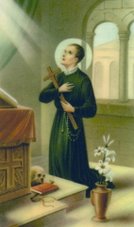
It is with great joy that I share the announcement that
Fr Antonio Rosmini is being raised to the glory of the altars! After a long and difficult process, his beloved followers have persevered to finally see tomorrow, the Beatification ceremony of the Venerable Servant of God, in the small town of Novara in Northern Italy.
Rosmini was born in Rovereto (then part of Austria), 1797. He was a deeply intelligent boy, excelling at all his subjects. He was ordained at the age of 24 and received his degree from the University of Padua a year later. When he was brought to Rome, his reputation preceded him, and even the Pope of the time, Pius VIII, personally recommended that he devote himself entirely to his writing.
 He wrote many works
He wrote many works, including philosophy, theology, spirituality, politics and ecclesiology. At the age of 42, the congregation which he founded, the Institute of Charity, received official papal approval from Pius IX, a personal friend. However, he eventually fell out of favour with the papal court in large part due to the political strife of the time, with Rosmini opposing the actions surrounding the war with Austria.

It has now been over 150 years since Rosmini died, amidst a certain amount of suspicion from the churchmen of his day, including the Jesuits. Two of his books were placed on the Forbidden Index, and 32 years after his death a series of 40 propositions drawn from his works were condemned by the Holy Office. However, in 2001 he was 'absolved' of these charges, in a
document issued by none other than Cardinal Joseph Ratzinger for the Congregation for the Doctrine of the Faith.
On July 1st last year he was declared Venerable, in that his life and writings expressed true Christian virtue to a heroic degree. Finally, on 6 March this year, a
decree was issued detailing a miraculous cure attributed to the intercession of Rosmini before our Heavenly Lord, whereby a nun living (and dying) in Novara, was relieved of her
terrible affliction.

But of all the many virtuous Christians acknowledged by Holy Mother Church; why do I draw my attention to this one? Well, as a misguided youth I was shown very clear paths in life by my attendance at a
school founded by the Rosminian order. It is an interesting place for many reasons, but I will simply say that its founding principles are noble, and a good guide for Catholic education today. Visit
this site to explore some of the present-day work in the footsteps of a true saint in the life of the Church, based in a neglected corner of my old school.
Rosmini's intercession will always be sought by myself for difficult intellectual problems that continually stump me in life... most importantly when faced with those who use so-called 'intellect' to disprove the very existence of God. Rosmini, incidentally, had his own writings on this topic, especially in his
Nuovo saggio sull'origine delle idee (New Essay Concerning the Origin of Ideas). When Rosmini was a little younger than myself, he wrote the following poem, which I will close with:









 It is with great joy that I share the announcement that
It is with great joy that I share the announcement that 
 It has now been over 150 years since Rosmini died, amidst a certain amount of suspicion from the churchmen of his day, including the Jesuits. Two of his books were placed on the Forbidden Index, and 32 years after his death a series of 40 propositions drawn from his works were condemned by the Holy Office. However, in 2001 he was 'absolved' of these charges, in a
It has now been over 150 years since Rosmini died, amidst a certain amount of suspicion from the churchmen of his day, including the Jesuits. Two of his books were placed on the Forbidden Index, and 32 years after his death a series of 40 propositions drawn from his works were condemned by the Holy Office. However, in 2001 he was 'absolved' of these charges, in a 


045.JPG)











